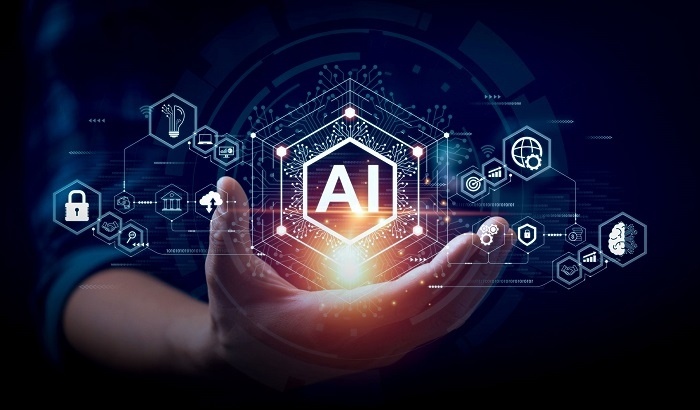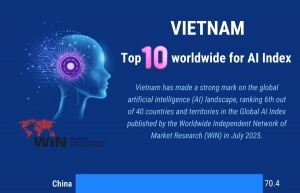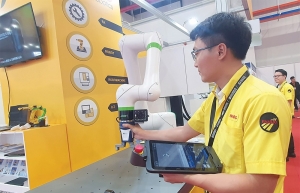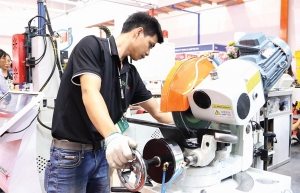INTERNATIONAL INVESTMENT
AND PORTAL

As AI continues to evolve at a breakneck pace, its impact on employment is becoming impossible to ignore. Just days ago, OpenAI – the company behind ChatGPT – unveiled a new feature that allows the tool to complete multiple tasks independently. This next-generation 'Agentic AI' no longer simply responds to prompts but can now think and act on behalf of users, handling complex, multistep work. According to Oanh, such breakthroughs are accelerating major shifts in workforce dynamics.
For example, you can now ask ChatGPT to handle complex tasks like, "Check my calendar and brief me on upcoming client meetings using the latest news," or "Analyse three competitors and create a presentation." The tool will automatically browse websites, filter results, and carry out the analysis. You can even step in to adjust the request mid-process without disrupting the entire workflow.
The rapid advancement of AI continues to fuel concerns about machines replacing human jobs. Even Microsoft founder Bill Gates has predicted that only three professions are likely to endure the AI revolution: coders – the architects behind AI, energy experts, and biologists.
According to the World Economic Forum, accelerating technology, the green transition, and broader economic and demographic shifts are fundamentally reshaping the global labour market. Over the next five years, these forces are expected to create 170 million new jobs while displacing 92 million, resulting in a net gain of 78 million roles by 2030.
The Future of Jobs 2025 report found that the three fastest-growing roles between 2025 and 2030 are all technology-driven: big data specialist (up 110 per cent), fintech engineer (up 95 per cent), and AI and machine learning specialist (up 80 per cent).
Interestingly, farm work is projected to see the largest absolute growth by 2030, with an estimated increase of 35 million jobs. This surge is largely fuelled by the green transition, as governments and businesses ramp up efforts to cut carbon emissions and adapt to climate change.
Following closely are delivery drivers, construction workers, salespersons, and food processing staff. These roles are also projected to grow significantly over the next five years. While technology plays a role, their rise is also driven by demographic shifts such as an ageing population and ongoing economic uncertainty.
Conversely, the fastest-declining jobs are expected to include primarily clerical roles such as cashiers, ticket clerks, administrative assistants, printing workers, accountants, and auditors. The decline is largely driven by broader digital access, advancements in AI and information processing, and the growing use of robots and autonomous systems. According to the International Labour Organisation, around 2.3 per cent of jobs globally are at risk of full automation due to generative AI.
Currently, 47 per cent of work tasks are carried out entirely by humans, but this is expected to fall to 33 per cent by 2030. The shift is even more marked in financial services and capital markets, where the share of human-only tasks is projected to drop from 44 to 28 per cent. This trend reflects the growing impact of automation, not just in replacing purely human work, but also in reshaping roles that depend on human-machine collaboration. Meanwhile, ageing populations and shrinking labour pools are accelerating the decline of clerical positions.
As the job market continues to evolve, it’s vital for workers to stay informed and upskill to remain competitive. Yet a study by The Adecco Group shows that just 11 per cent of today’s workforce is genuinely prepared for the future and equipped with the adaptability needed to navigate uncertainty and capitalise on emerging opportunities.
At the same time, employers worldwide anticipate that 39 per cent of core job skills will change within the next five years – a figure that stands at 37 per cent for Vietnam.
Employers today identify the following as the top 10 core skills needed in the workforce: analytical thinking; resilience, flexibility, and agility; leadership and social influence; creative thinking; self-motivation and self-awareness; technological literacy; empathy and active listening; curiosity and a commitment to lifelong learning; talent management; and service orientation with a strong customer focus.
Over the next five years, employers anticipate a major shift in the skills they value most. AI and big data are expected to lead the list, followed closely by networks and cybersecurity, along with technological literacy. This shift is especially pronounced in the financial services and capital markets sector, where rapid digital transformation is driving demand for specialised technical capabilities.
In response, businesses are accelerating efforts to upskill and reskill their employees. By 2030, employers project that only 41 per cent of their workforce will not require additional training. Meanwhile, 29 per cent will need to be upskilled to meet the demands of their current roles, and 19 per cent will need to be reskilled and redeployed into new positions to stay relevant in a fast-changing labour market.
Most businesses (86 per cent) are eager to invest in workforce training because they recognise the clear benefits. The top advantage is enhanced productivity, followed by stronger business competitiveness and improved talent retention.
At HSBC, for example, employees have access to a wide array of learning opportunities, spanning topics from AI and Data to sustainability. These offerings are tailored to various skill levels, ranging from foundational to advanced, allowing staff to choose options that align with their current knowledge and development goals.
Let’s revisit a question that's been on many minds since ChatGPT took the world by storm a few years ago: "Will AI 'steal' human jobs?" The answer remains no – AI won’t completely replace humans. GenAI still has its limits, especially when it comes to tasks requiring hands-on execution, nuanced interpretation, or human-to-human interaction. More importantly, when individuals are equipped with the right skills, they can harness technology as a powerful tool to enhance their work rather than be replaced by it.
Looking at the broader landscape, as major macro trends reshape the job market, both employees and employers must take an active role in adapting to change. Workers need to continuously build skills that align with emerging roles, while businesses must adopt forward-thinking strategies in human resource development to remain resilient and transformation-ready.
 Vietnam ranks among world’s top 10 in AI Index
Vietnam ranks among world’s top 10 in AI Index
Vietnam has made a strong impression on the global artificial intelligence (AI) landscape, ranking 6th out of 40 countries and territories in the AI Index released by the Worldwide Independent Network of Market Research (WIN) in July 2025.
 Time is now for Vietnam to fully cultivate AI talent
Time is now for Vietnam to fully cultivate AI talent
Vietnam is well-positioned to fully develop AI talent through government support, international collaboration, and an influx of foreign experts.
 AI transforming Vietnam’s businesses for the better
AI transforming Vietnam’s businesses for the better
While AI is a key in the process of innovation and accelerating economic development, it needs support from many sides to strengthen the workforce and related startups.



















